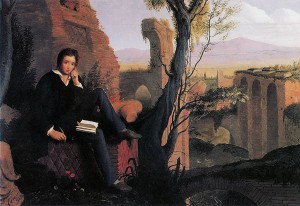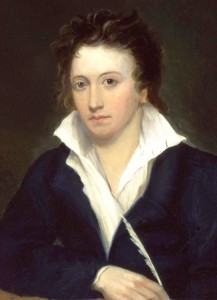Ode to the West Wind
I
O wild West Wind, thou breath of Autumn’s being,
Thou, from whose unseen presence the leaves dead
Are driven, like ghosts from an enchanter fleeing,
Yellow, and black, and pale, and hectic red,
Pestilence-stricken multitudes: O thou,
Who chariotest to their dark wintry bed
The wingèd seeds, where they lie cold and low,
Each like a corpse within its grave, until
Thine azure sister of the Spring shall blow
Her clarion o’er the dreaming earth, and fill
(Driving sweet buds like flocks to feed in air)
With living hues and odours plain and hill:
Wild Spirit, which art moving everywhere;
Destroyer and Preserver; hear, O hear!
II
Thou on whose stream, ‘mid the steep sky’s commotion,
Loose clouds like Earth’s decaying leaves are shed,
Shook from the tangled boughs of Heaven and Ocean,
Angels of rain and lightning: there are spread
On the blue surface of thine airy surge,
Like the bright hair uplifted from the head
Of some fierce Maenad, even from the dim verge
Of the horizon to the zenith’s height,
The locks of the approaching storm. Thou dirge
Of the dying year, to which this closing night
Will be the dome of a vast sepulchre
Vaulted with all thy congregated might
Of vapours, from whose solid atmosphere
Black rain, and fire, and hail will burst: O hear!
III
Thou who didst waken from his summer dreams
The blue Mediterranean, where he lay,
Lulled by the coil of his crystalline streams,
Beside a pumice isle in Baiae’s bay,
And saw in sleep old palaces and towers
Quivering within the wave’s intenser day,
All overgrown with azure moss and flowers
So sweet, the sense faints picturing them! Thou
For whose path the Atlantic’s level powers
Cleave themselves into chasms, while far below
The sea-blooms and the oozy woods which wear
The sapless foliage of the ocean, know
Thy voice, and suddenly grow grey with fear,
And tremble and despoil themselves: O hear!
IV
If I were a dead leaf thou mightest bear;
If I were a swift cloud to fly with thee;
A wave to pant beneath thy power, and share
The impulse of thy strength, only less free
Than thou, O Uncontrollable! If even
I were as in my boyhood, and could be
The comrade of thy wanderings over Heaven,
As then, when to outstrip thy skiey speed
Scarce seemed a vision; I would ne’er have striven
As thus with thee in prayer in my sore need.
Oh! lift me as a wave, a leaf, a cloud!
I fall upon the thorns of life! I bleed!
A heavy weight of hours has chained and bowed
One too like thee: tameless, and swift, and proud.
V
Make me thy lyre, even as the forest is:
What if my leaves are falling like its own!
The tumult of thy mighty harmonies
Will take from both a deep, autumnal tone,
Sweet though in sadness. Be thou, Spirit fierce,
My spirit! Be thou me, impetuous one!
Drive my dead thoughts over the universe
Like withered leaves to quicken a new birth!
And, by the incantation of this verse,
Scatter, as from an unextinguished hearth
Ashes and sparks, my words among mankind!
Be through my lips to unawakened Earth
The trumpet of a prophecy! O Wind,
If Winter comes, can Spring be far behind?
Poem by Percy Bysshe Shelley (1792-1822)
Featured Painting: Percy Bysshe Shelley, by Alfred Clint (1807-1833)
via Wikimedia Commons
Jack Ramey talks about Shelley and reads Ode to the West Wind.
I love Shelley. His beautiful poetry, and his beautiful soul. His fine mind. I love him because he hated hypocrisy, he hated injustice, especially against the poor and downtrodden, and he loved liberty and freedom above all.
And also I love him because he recognized the genius of John Keats when the critics and even Byron dismissed him as an uneducated Cockney. He wrote one of the greatest elegies in the language, Adonais, an elegy on the death of Keats.
 Shelley was all air, an ethereal spirit communing with gods and goddesses and the spirits of mountains, and rivers, and trees. And the divine spirit of the wind.
Shelley was all air, an ethereal spirit communing with gods and goddesses and the spirits of mountains, and rivers, and trees. And the divine spirit of the wind.
He wrote his marvelous poem, Ode to the West Wind, while in Florence in late October 1819, after a walk through the woods that skirt the Arno River during a fierce wind and rain and hail storm. The violence in the transition of the seasons from autumn into winter is seen as a revolutionary act that will benefit mankind in the coming peace of a symbolic spring. The physical storm and its metaphorical possibilities excited his great poetic imagination, and he went home and this poem literally poured out of him.
Portrait of Shelley Writing Prometheus Unbound by Joseph Severn (1793–1879)
via Wikimedia Commons

